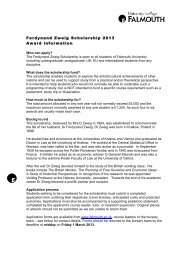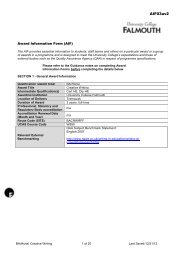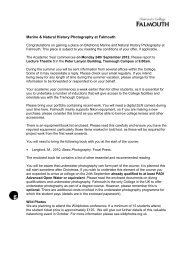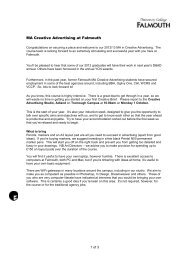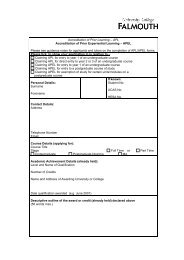Postgraduate Study Guide 2012 - University College Falmouth
Postgraduate Study Guide 2012 - University College Falmouth
Postgraduate Study Guide 2012 - University College Falmouth
You also want an ePaper? Increase the reach of your titles
YUMPU automatically turns print PDFs into web optimized ePapers that Google loves.
What next?<br />
—<br />
How Much Will it Cost?<br />
All students<br />
www.falmouth.ac.uk/studentfinance<br />
student.fees@falmouth.ac.uk<br />
telephone 01326 213778<br />
Fees and charges are reviewed annually and are detailed<br />
on our website. For advice and information about tuition<br />
fees and other charges, please contact the <strong>University</strong><br />
<strong>College</strong>’s Finance Office as above.<br />
Tuition fees are payable in two equal instalments.<br />
For courses that commence in October the instalments<br />
are due in October and January, and for courses that<br />
start in January the instalments are due in January<br />
and May. In certain circumstances alternative instalment<br />
arrangements may be available. Fee sheets for individual<br />
courses are available and you are advised to refer to<br />
these before making an application.<br />
If you have graduated from <strong>University</strong> <strong>College</strong> <strong>Falmouth</strong><br />
or Dartington <strong>College</strong> of Arts in the last five years, you’ll<br />
be eligible for a one-off progression discount of £300 for<br />
any postgraduate study.<br />
International students<br />
www.falmouth.ac.uk/international<br />
international@falmouth.ac.uk<br />
telephone +44 (0)1326 213794<br />
Fax +44 (0)1326 370725<br />
For up-to-date information on tuition fees, discounts and<br />
living costs, please contact the International Office as above.<br />
Funding a postgraduate course at <strong>Falmouth</strong><br />
A Master’s degree or PhD represents a significant<br />
investment in your future, and you’ll rightly be concerned<br />
about funding. This section is intended to introduce you to<br />
ways of funding your postgraduate course at <strong>Falmouth</strong>. A<br />
year of full-time postgraduate study is likely to cost around<br />
£8,000 plus tuition fees, so you’ll need to do some planning<br />
in order to get through the course without the distraction<br />
of financial problems.<br />
Apply early to the <strong>University</strong> <strong>College</strong> if you can and, if<br />
successful at interview, accept your place as soon as possible<br />
in the year before you wish to begin studying a postgraduate<br />
course. This will give you more time to arrange your finances<br />
and apply for major sources of funding whose competitions<br />
have an early deadline.<br />
For advice and information on all aspects of postgraduate<br />
funding, please contact the bursary Adviser<br />
telephone 01326 213744<br />
bursaries@falmouth.ac.uk<br />
www.falmouth.ac.uk/bursaries<br />
Professional & Career Development loans<br />
Around 80% of all UK postgraduate students fund their<br />
studies through a Professional & Career Development Loan<br />
(PCDL). Generally aimed at postgraduate students, PCDLs<br />
are a scheme designed to help people who want to improve<br />
their career prospects, but lack the funds to invest in a<br />
suitable vocational programme.<br />
For further details, please call the free phone information<br />
number 0800 585 505 or visit www.direct.gov.uk/cdl<br />
— A PCDL is a bank loan designed to help you pay for workrelated<br />
learning. You don’t have to start paying your loan<br />
back until at least one month after you stop training.<br />
— You can take out a PCDL whether you are employed,<br />
self-employed or unemployed.<br />
— PCDLs are available through an arrangement between<br />
the government and two high street banks.<br />
— Remember that a PCDL is a personal loan between you and<br />
the bank, and you’re responsible for repaying it to the bank.<br />
Before taking out a loan, check how much your monthly<br />
repayments will be, and that you feel confident that you<br />
will be able to make them.<br />
there are three areas that a PCDl can cover:<br />
— Course fees (up to 80% of course fees)<br />
— Other course costs<br />
— Living expenses<br />
Your loan can cover one or more of these elements,<br />
but cannot exceed £10,000 in total. PCDLs will only support<br />
the vocational or learning elements of a course.




